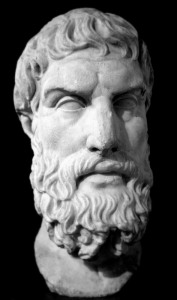
“Progress.” “The right side of history.” ….and, as obliquely addressed in my previous post, the ubiquity of thinking of reality merely in terms of social construction – with concerns regarding “limits” and “barriers” being put to rest at an ever faster pace.
Oh, the utter certainty and confidence of so many of our contemporaries! It puts so many of us Christians to shame!
St. Augustine and the churches of the 16th century Reformation talk much about the inborn nature and power of sin – where sin is an evil infection (leprosy was a common image) of our [very] good human nature, created in God’s image. Hence, for example, while marriage and the natural bond of love between parents and children is intrinsically good and desirable (oye), the inborn self-centeredness, selfishness, tainted love, and even incipient racism in even very young children is not (more detail about the nature of sin in this post). In short, we are not conceived desiring to fear, love and trust in God – and therefore desiring to love our neighbor as ourselves. Rather, there is in fact a passionate hatred of God – that unless checked by the faith-creating and life-giving word of God – will burn within us. We can call this the fire of sin.
But if sin is a fire there is also proud human reason’s stoking of that fire.
Charles Taylor, in his magisterial work A Secular Age, says of what he calls “scientific materialism”:
“…the appeal of scientific materialism is not so much the cogency of its detailed findings as that of the underlying epistemological stance, and that for ethical reasons. It is seen as the stance of maturity, of courage, of manliness, over against childish fears and sentimentality” (p. 365, p. 77 in James K.A. Smith).
(note that epistemology basically means the study of knowledge: how and/or why do we know what we know?)
 James K.A. Smith, an interpreter of Taylor attempting to popularize his work, says the following of Taylor’s epistemological geneology:
James K.A. Smith, an interpreter of Taylor attempting to popularize his work, says the following of Taylor’s epistemological geneology:
“’Descates, Locke, and Hume…carved [experience] into shape by a powerful theory which posited the primacy of the individual, the neutral, the intra-mental as the locus of certainty’…In fact, Taylor points out, undergirding this epistemological theory is actually a moral valuation: ‘There is an ethic here, of independence, self-control, self-responsibility, of disengagement which brings control’. So the theory is value-laden and parades itself as ‘a stance which requires courage, the refusal of the easy comforts of conformity to authority, of the consolations of an enchanted world, of the surrender to the promptings of the senses” (pp. 559, 560) … That is a story, not neutral data, and Taylor has been contesting such self-congratulatory stories all along. (pp 559, 560; in 99, Smith)
Read that above quote one more time. Note that this is not just a post-Darwin thing. This has been going on for a long time – note the 3rd century debates between Origen and the pagan critic of Christianity Celsus.
I think we can sum things up in the following way: at root, what is deemed immature by the highest of men is not belief in God per se, nor that the world is designed, nor that there is true right and wrong, etc., but rather that God – particularly that “nasty and psychologically abusive” O.T. God – would dare judge us elite men – we who exercise such scientific, effective, and responsible control over his universe… (yes, and as regards exercising “responsible control” that even goes for the-longing-for-re-enchantment Romantics who want to put the brake on the worrisome reductionistic tendencies they see… but not too much!)

The nerve!
Of course, this is what the Scriptures would tell us is going on…
“… the prophets who prophesy to you, [fill] you with vain hopes. They speak visions of their own minds, not from the mouth of the LORD.” (Jer. 23:16)
“…although they knew God, they did not honor him as God or give thanks to him, but they became futile in their thinking, and their foolish hearts were darkened… they exchanged the truth about God for a lie and worshiped and served the creature rather than the Creator” (Rom. 1:21, 25)
“God sends them a strong delusion, so that they may believe what is false…” (II Thes. 2:11)
…but that is not the story that any elite wants to hear! They have to make up something else and so they do (and really believe it with all their heart!):
“’growing up’ to ‘face reality’ are [real] stories of courage – the courage to face the fact that the universe is without transcendent meaning, without eternal purpose, without supernatural significance. So the convert to unbelief [from the biblical view] has ‘grown up’ because she can handle the truth that our disenchanted world is a cold, hard place.” (77, Smith)
Ah, the pure motives are saved… and so they are saved…! And so man is justified! But not so fast. Taylor adds the following, raising the spectre of the Greek philosopher Epicurus:
“’At the same time, there can be something exhilarating in this loss of purpose and teleology, because if nothing matters, and we have the courage to face this, then we have a kind of Epicurean invulnerability. While such a universe might have nothing to offer us by way of comfort, it’s also true that ‘in such a universe, nothing is demanded of us’ (p. 367) Now the loss of purpose is also a liberation: “we decide what goals to pursue.” God is dead; viva la revolution. (in Smith, p. 77, 78)*
This is the “reasonable man” every sophisticated modern westerner thinks they are. And as I noted in a recent post….
“it seems to me that all of this is pointing in a certain direction which is this: when it comes to Reason’s march in the battle of ideas, those ideas that are true will work and those that work will be true. While it may take time to play out in history, the Reasonable persons know that the best will rise to the top – leaving those who refuse to be enlightened and progress in the dustbin of history. For those who have inherited Christianity’s moral capital, they now think they can be most “Christian” by leaving Christianity behind.”

Getting more specific about what is going on here in more intellectual terms: their novel view is based purely on what is today called the “coherence theory of truth”, that is the idea that that view is closest to the truth which best takes into account all of the facts. Note the “practical” (pragmatic?) view here: it “works” the best (one can see here how the idea of “useful fiction” can become the one ring to rule them all). The coherence theory of truth certainly sounds like wisdom on the face of it. But here is an important key: as regards this secular worldview of which we are speaking, it is also supremely important that it “work” well as regards how one wants to, or thinks they should live – in fact, as Taylor argues, this is the primary consideration (sex is involved here, but at root is a rebellion against the God who judges*), even though this is almost never recognized or explicitly stated.**
And, this is where the idea of the “correspondence theory of truth” must inevitably come back into the picture: the prevailing “coherent” modern/secular picture or view is only imagined to be “coherent” because of what is suppresses – it does not take into account all of the facts that should (note “should” is a word of morality) be recognized to be important… (for example, see this from Hans Fiene) In other words, “coherence” in this sense really means “what’s true and what is false is in part a function of what our standards of truth and falsity are.” And one might add the following, which certainly need not be conscious: “if we see fit to ignore this or that…so be it.” Nevermind the fact that, in the long run, society as a whole is not going to be able to live the way they do, essentially ignoring what they think is all the “apparent” design – and corresponding purpose – in the natural world. (thanks Mr. Kant, for lulling us all to sleep in thinking that it was OK to think that this purpose in nature could not be considered knowledge but “practical reason” that we could only have strong convictions about…)
In short, the “social imaginary”, as Charles Taylor calls it – the water that even we Christians to some degree swim in, feel, and might come to reflect on (depending on how we raised by our families and churches) – is aptly called the “social illusionary”.***
So consider this a call to repentance – to the church of God (non-church folks are welcome to – Christ’s blood does avail for all). For our own complicity in the modern social imaginary due to our own lack of confidence in His word as that which is reliable, true, life-altering…which lasts forever. We need a renewed appreciation for the wisdom of God’s word – and the folly of man.
FIN
Notes:
*“Taylor thinks ‘there is no escaping some version of…. fullness,’ our debates are really about ‘what fullness consists in’ (p. 600). He suggests that what’s really at issue here is the telos of human life, ‘the ends of life’ (p. 602). In other words, the debate about ‘real fullness’ is a debate about how to understand our ‘ethical predicament’: What counts as ‘fulfillment’ (playing on ‘fullness’)?…. It is here that Taylor’s argument seems to take a decidedly ‘apologetic’ turn….[can “closed” takes on the immanent frame really offer satisfying accounts?]….” (pp. 104-105, Smith)
**And now, it is not so much about secular morality as it was envisioned during the early Enlightenment, but rather the authenticity of our moral choices…. In the 1992 Planned Parenhood vs. Casey decision of the Supreme Court these amazing words were uttered: “At the heart of liberty is the right to define one’s own concept of existence, of meaning, of the universe, and of the mystery of human life.”
***At the very least we can say this: in short, we should all be asking to what extent the sense of morality that we feel convictions about (often based on our personal experiences with others and our evaluations of the shorter or longer term consequences of our actions) drives or at least influences our consideration and evaluation of various kinds of evidence and their significance (correspondence theory of truth considerations) as well as various kinds of worldviews and their significance (coherence theory of truth considerations).












